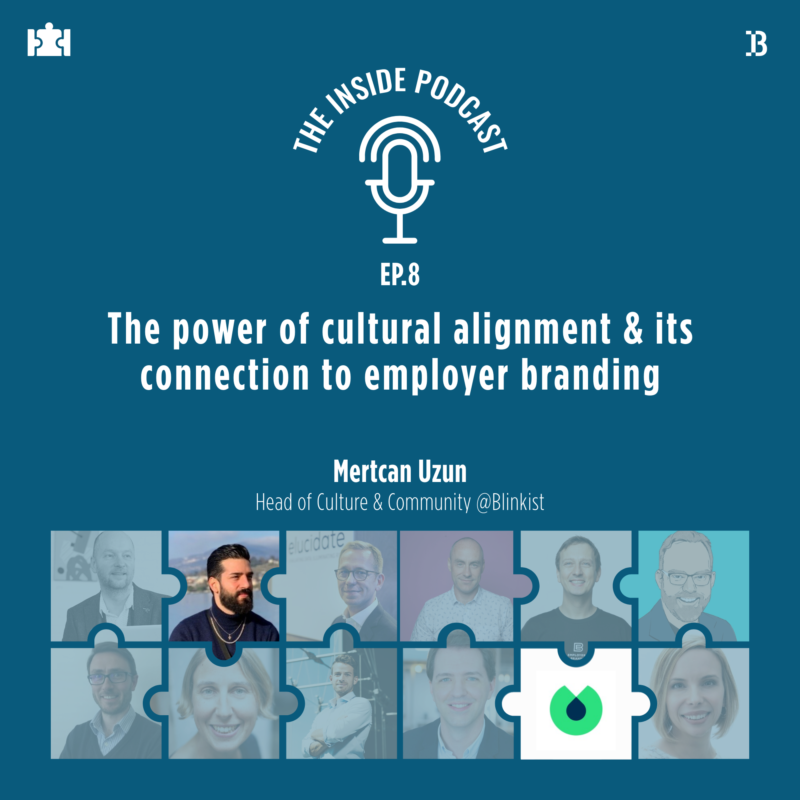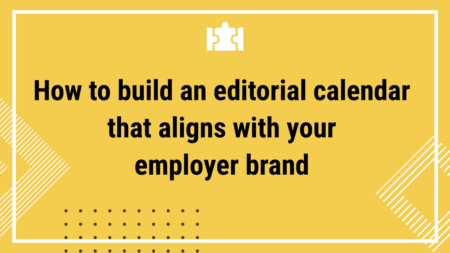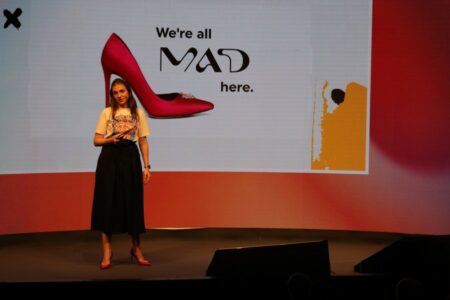Hi, my name is Georgiana. I am the CEO and founder of Beaglecat, and soon you will be listening to Employer Branding: The Inside Podcast. In this podcast, I regularly talk to employer branding managers and acquisition managers, and human resources managers in tech companies in Germany, Romania, and the US. For more content on employer branding-related themes, go to employerbranding.tech or beaglecat.com. Stay tuned!
Overview
We’re back, after a well-deserved holiday break, with episode 8 of #EmployerBranding: The Inside Podcast (season 6). This time around, Mertcan Uzun, Head of Culture & Community at Blinkist joined us for an interesting discussion on the power of cultural alignment and why it is crucial to protect the people in your organization. We also talked about honesty, fostering a healthy organizational culture, and more.
What you’ll learn by listening
- Insights on creating an engaged employee base
- Fostering a healthy company culture
- Initiatives that strengthen your internal employer brand
- The importance of prioritizing minority communities within an organization
- Protecting the people within the organization: the key to building a performance-driven culture
- Why cultural alignment matters in the context of employee engagement
- Employer branding, recruitment & cultural management: where should the three meet so that success can be achieved?
About Blinkist
Used by over 23 million people worldwide, Blinkist finds the most relevant, impactful nonfiction books and podcasts and distills them down to their key ideas, which can be read or listened to in 15-minute explainers from their award-winning app. Over 1,500 companies have already chosen Blinkist for Business to empower their teams at their point of need—anytime, anywhere.
Enjoy listening on Spotify!
Podcast transcription – Employer Branding T.I.P S06Ep.08
Georgiana:
Hi, everyone, Georgiana here with a new episode of Employer Branding: The Inside Podcast. As you all know, so far, I only get the best speakers for this podcast and today is no exception. My guest today comes from Berlin. Actually, he is an expert in diversity, people matters, and talent acquisition. He’s a public speaker also. Hi, Mertcan. Nice to have you here today. I hope I pronounced your name correctly, first of all. And secondly, I’d like to ask you to introduce yourself, I know that you work for Blinkist. But tell us exactly what you do.
Mertcan Uzun:
You pronounced my name correctly, which is very rare. It’s actually a Turkish name. So it’s not a common language. I moved to Berlin eight years ago. I moved to Berlin for one reason I was doing research on labor market discrimination. And I was specifically trying to understand why do we discriminate towards specific groups. And then I ended up in the startup world. I worked in three – including Blinkist – three different startups. But for the last three and a half years, I’m working at Blinkist. I started as a recruiter, and I was owning the employer branding function. And then I moved away from that. And currently, I am the head of culture and community. And my main objective or focus is to create an engaged employee base, where people have a sense of belonging, and also perform. So that is what I do.
Georgiana:
It’s actually a very impressive track record that you have there. And I think your expertise touches on many areas that have things to do with employer branding; which is why I invited you to talk to us on this podcast today. I’m wondering if we were to refer strictly to employer branding, how would you define it? You yourself, personally?
Mertcan Uzun:
I think Employer Branding, maybe I can make an analogy. I think Employer Branding, if a company is a house, I think Employer Branding is its garden and Windows. And I think it is a very important area where you make an impression on the people who live in that house. So to me, employer branding is about how you as an organization, are being known in the existing labor market. That is how I define it.
Georgiana:
I think that’s really spot on. And if you were to define it, the way your company, Blinkist does it?
Mertcan Uzun:
The way that we would define it Blinkist would be mostly maybe a little bit more performance-driven. And it would be considered as an acquisition channel, on how we get people to Blinkist. Blinkist is a very brand-focused company. So for us, paying attention and creating a realistic image of the company, is very important in acquiring people outside of Blinkist.
Georgiana:
I’m just loving this discussion. It’s so nice for me, you know, just to make a brief parenthesis to what we’re discussing today. The weather is terrible. And we’re in Berlin, and I tend to be so depressed recently. But I am getting such good info and such interesting insights from my guests. And that’s really giving me that good energy that I haven’t had today. So thank you so much for that.
Your company looks really nice. From the outside. Super nice. There’s a very high ranking on Kununu. You personally post a lot of interesting content and informative content on LinkedIn. And whenever I speak to people about Blinkist I’m getting the sense that it’s a good company to work in. If you were to define the culture to which you contribute, day after day into sentences. What would that be?
Mertcan Uzun:
First of all, I really appreciate the fact that you said that it’s a very nice company. I agree. Are we perfect? No, we could definitely do so many things way better. But the way that I always try to define the Blinkist culture in one sentence is this: it is a place where I can challenge a statement that is made by our CEO in a public setting. This is our culture. And this involves so many deep connotations.
To me, this means psychological safety. To me, this means respect. To me, this means a value of taking risks, a value of saying no. And with the constant pursuit of having a moment of learning, because this is also what our product does. Yeah. So I think that in our culture, we are very vulnerable, we are very open. And there is no hesitation in going away from hard conversations.
Georgiana:
Yeah, which is no little thing, especially in Germany, if I can, maybe it’s an uncomfortable statement to make for some of my listeners, but most companies are not enjoying the same level of liberty that you were mentioning previously. So that’s really good. Are there policies and Blinkist, that you have initiated personally, for fostering a healthy company culture? Or are there things that you are super proud of, and that you’ve seen work and give results on a day-to-day basis?
Mertcan Uzun:
So many. But I think using the word “I” would be an exaggeration because I obviously did with quite a big team. I think there are so many, but maybe a couple of things that we did this year that are really sticking with me. For example, we created two types of coaching this year. I created a coaching budget, which was the first group that was very much dedicated to minorities at Blinkist. So why, why did we come up with this was the fact that we do provide a coaching budget for our leaders.
And when we look at our leaders, we see that they’re mostly white male cisgender. So we realized that indirectly, we were actually feeding them to have more access to the perks, that this majority group. So we created a minority coaching budget, which was dedicated only to minority groups. So they could also apply for a budget and they would be granted the same amount. So with this, what we wanted to do is we wanted to bring down the gap of access to information, knowledge, and skills by providing and taking affirmative action.
Another coaching budget we created was for mothers. So throughout surveys, we observed the fact that we had a lot of mothers leaving Blinkist, and after coming back their satisfaction rates were also lower. So we actively provide them a coaching budget, and they get coaching for re-onboarding to the organization. And in the same package, their leads also get one session with an expert, where they also get trained on how to re-onboard parents, especially mothers who are coming back from their long leave. This was one of the initiatives. Another initiative that I did this year, is one that I’m very proud of.
This year I coached my own leadership team, C-level on inclusion, diversity, and belonging. So we actually observed and analyzed what are the biggest minority communities within Blinkist. And we had a four-week-long cohort session with our leadership team where we used our own product to learn the experiences of these minorities and had a facilitated session in the pursuit of increasing the awareness among our leadership team towards those communities, and also coming up with like very tangible next actions to increase the sense of belonging for those communities. There are so many other things that I can list. But these are the two that stuck with me the most for this year.
Georgiana:
And these are impressive in themselves, but also the fact that the leadership came to you and asked for this type of coaching. I think that they’re setting an amazing example. So again, kudos to Blinkist for that. Blinkist, which used to be very small like every other big company nowadays, grew so much. I’m wondering if if in these three years, three and a half years that you’ve been with the company, Have things changed? What has changed? What has remained the same? What has changed for the better? What for the worse?
Mertcan Uzun:
I think the change has happened. Definitely. I think one of the things that I observed that has changed was, we had a very harmony-driven culture. So we would not maybe have tough conversations. Because we were very people-centric, we are still people-centric. But now we’re going into a more performance-driven culture, which I actually personally appreciate a lot. That is one of the changes that we’re having. Obviously, this is not for everyone. We also observed that throughout the last three years.
One thing that has never changed, and it’s still whenever we run our engagement surveys that are still at the core of the answers is our focus on people. If you come today to the office and ask people, what is the one thing that you value the most that Blinkist, people are going to tell you the people that we have at Blinkist. I don’t know how we did it, and how we’re doing it. But we really have very passionate, very driven, very humble, very vulnerable people in the organization. And that is one thing that we try to protect, protect the most.
Georgiana:
It’s funny in a way that you mentioned this because someone was asking me a few days ago, if you were to list the main reasons why people come or go in a company, and he was mentioning team was the fourth I think, or the fifth one, but first was salary, then career growth. And there was another one, a work-life balance, and the team. And I said, you know what, I think we should all just leave the team aside from all these scenarios. Because always, absolutely always, in every company, people are going to come, stay or leave, because of the people, people is something that’s, you know, it shouldn’t be in this something,
Mertcan Uzun:
It should be natural. And also, here’s why. Because we don’t realize it maybe that much. But we spend most of our time, especially if we’re working in a corporate environment, we spend most of our time with people from work. It’s like, I see my colleagues more often than my partner, my family, my friends, in no matter how high is my salary, no matter? What are the options that I have, if the people in I are not aligning in our values, or in our traditional, you know, ethics, or in terms of like cultural empathy, it is going to be very hard for people to stay or keep me in the organization.
Georgiana:
Exactly. So I think for organizations that manage to tick this box of people, I think all the rest is very, very easy to accomplish
Mertcan Uzun:
And all the things are super easy to change as well because it’s outside of people. But changing people, changing values, changing a mentality and mindset is one of the slowest things that you can do in the world.
Georgiana:
And the hardest. It’s so ingrained into what the company is that through. Coming back to Blinkist. The median tenure for people in Blinkist is about one in eight months. If I read correctly on LinkedIn, it’s actually
Mertcan Uzun:
It’s even higher. We did some research before and it’s 2.3.
Georgiana:
So would you say that people only stay for the people? Why else? It’s a long, long time, right for Berlin.
Mertcan Uzun:
It’s long and not necessarily a good thing as well. You know, I think it’s always good to have a refreshing team base. I think it could be very beneficial for companies as well. We used to have even longer, it was way, way longer. And we have seen a decrease but still it’s very high compared to other companies. And I think there are a couple of things why people stay. In my opinion, the company’s success is one of the ingredients. Another one is we really pay attention to well-being which is on top of our priorities.
We have well-being days where all the whole company’s off. We have experiments like summer hours where we took three months and made five days of vacation day. We have our own canteen in the office where we are basically offering free healthy vegan lunch, and we offer free access to therapy. All these things are obviously making it a good place to work. And I think another thing that our people enjoyed the most is our product. I think we really have an impact on the world that is that has a positive outcome. We make learning accessible, we make information accessible. And I think that is fun as well. And that is a good cause to be to be part of.
Georgiana:
Yes, yes, indeed. If you were to think of all the tech scene in Berlin, you’ve been here quite a while. So what I’m talking about, what do you feel? is the one thing that’s missing, but like strikingly missing from here? When it comes to company culture?
Mertcan Uzun:
That’s a very good question. I have so many different answers. But one thing that stuck with me is I think we are still not at the age where we’re honest about company cultures. And I think it should be completely honest, and okay to share how you work how you live in that specific organization. So for example, if now I am doing an a branding about an employer of Blinkist, there’s like a fun, inclusive, inclusive, diverse workplace where you can take risks, where you are valued for the ideas that you bring.
But when you come to the organization, you see that it’s actually not inclusive, and then you see that it’s very only performance-driven, people are not being valued. That creates a lot of clashes. And it creates a lot of tension. And I think a lot of companies fall into that trap, to believe that if they are perceived good, people are going to come and stay, which is the biggest myth, it’s not going to happen. Because people really want to experience the things that they have been told they’re going to be experiencing. And I think that honesty is missing, I have seen so many companies sharing throughout Black History Month, I don’t know stuff on the pride month, another thing, just to, you know, confirm or fit in to the current status quo, but not actually committing or really walking the talk. And I think that creates tension.
Georgiana:
I couldn’t have said it better. And I’m really happy that you brought this into discussion because in the end, I think Berlin sucks at Employer Branding. Because in the end, employer branding is just this: showing your organization for what it is and for who it really is, even if it’s not perfect.
Mertcan Uzun:
Exactly. I’m sure you’re gonna find the right people if you’re just honest with yourself.
Georgiana:
Exactly, exactly. Yeah, we can talk for hours about this and write articles, long articles about this topic. We’re approaching the end. So I have two more topics to dive into. You come from talent acquisition, right? So you also know the struggles of recruiters when it comes to acquiring and retaining people. What Employer Branding should be doing it at this stage? Where do you think employer branding and recruitment and cultural management should meet? Because we were saying in reality, there’s a clash between them? Where should they intersect in real life so that it’s all successful in the end?
Mertcan Uzun:
That’s a good question as well. And I think they should all have a purpose, very defined purpose, and really located in where do they fit in the journey of acquiring a person and retaining that person. And they should not tell different stories. Because the moment you start telling different stories, you start losing people. So I think aligning these three dimensions that you mentioned, with the same goal, and Northstar and saying that these three exist because of that thing that we want to achieve, and how they can support each other.
Defining that is key. I often see a lot of companies having a mismatch and not alignment between these three. So they end up telling various different stories, which creates a lot of confusion for people, for candidates, for people who are working in the organizations. And that is where they can meet. I would not maybe recommend like having all of them in one team. But I think having a very cross-collaboration between these three teams or functions is very important.
Georgiana:
Yeah, and I think you mentioned something crucial. That Northern Star that all functions or departments should be following is basically, well-aligned leadership, or well-aligned business objectives, which so many times lack. And this is why I’ve seen at least in some of the companies that I worked for and with, you get people from marketing attacking people in HR, and people in employer branding being upset with people in HR for not collaborating. And it’s sad when you’re in the middle of it. It’s really sad and frustrating. And yes, I think it all comes down to that one objective that everyone should know and follow. That’s stronger than personal beliefs and animosities. And now, the last question.
You have quite a few diversity and inclusion initiatives in place at Blinkist. Why are they so personal to you? Now, I understand because you’ve told me your personal context as well from eight years ago, and the areas of study that you were into at the time. But again, why are they so important to you? Why did this area stick with you? And also, I think another question would be if you are ever able to measure the impact of these initiatives and be it, it’s already a lot of content.
Mertcan Uzun:
It’s important because I believe research shows that today, we still discriminate towards specific groups structurally, and individually. And I think no one deserves to be expected to perform if they are not given the platform to be who they want to be. So I think the reason that we’re doing it first number one, is because it’s the right thing to do. And as an organization that holds power, it is our responsibility to act on these promised initiatives to make the world and also the workplace a better place.
Secondly, we want a high-performing team. And we can’t have a high-performing team, if our team members do not feel they belong to the organization, don’t have a sense of belonging, or don’t feel included, because this is definitely going to demotivate them, which is going to have an impact on their performance. So as much as it is a societal responsibility. It’s also a very business-focused decision. And how do we measure it, we do run yearly run, inclusion, diversity, and belonging surveys, where we measure the data. We also, in our engagement survey, we have specific questions that are very much focused on these topics. And that’s how we measure these initiatives.
Georgiana:
And that’s how I believe you get buy-in from leadership. This has been very, very informative and a lot of fun, and I’m happy I got to talk to you in a video conference, and I wish to continue being there because you really have a strong voice and I think you have the voice for the people who don’t really have a voice.
Mertcan Uzun:
Thank you very much for having me.






